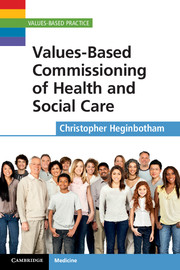Book contents
- Frontmatter
- Contents
- Acknowledgements
- Preface: Values-based Commissioning
- List of Abbreviations
- Chapter 1 Values-based practice in health and social care
- Chapter 2 Policy and practice
- Chapter 3 Health and social care reforms in England
- Chapter 4 Evidence and outcomes: commissioning for value
- Chapter 5 Patient and public involvement
- Chapter 6 The ‘new’ public health
- Chapter 7 Integrative commissioning for health and social care
- Chapter 8 Priority setting and resource allocation: values, ethics, evidence
- Chapter 9 Outcomes-led commissioning
- Chapter 10 Market stimulation and market shaping
- Chapter 11 Values-based leadership
- Endnote
- References
- Index
Chapter 4 - Evidence and outcomes: commissioning for value
Published online by Cambridge University Press: 05 July 2012
- Frontmatter
- Contents
- Acknowledgements
- Preface: Values-based Commissioning
- List of Abbreviations
- Chapter 1 Values-based practice in health and social care
- Chapter 2 Policy and practice
- Chapter 3 Health and social care reforms in England
- Chapter 4 Evidence and outcomes: commissioning for value
- Chapter 5 Patient and public involvement
- Chapter 6 The ‘new’ public health
- Chapter 7 Integrative commissioning for health and social care
- Chapter 8 Priority setting and resource allocation: values, ethics, evidence
- Chapter 9 Outcomes-led commissioning
- Chapter 10 Market stimulation and market shaping
- Chapter 11 Values-based leadership
- Endnote
- References
- Index
Summary
Seven fat years: seven lean years
Commissioning health and social care services is both a cyclical programme and a progressive and extended process over a period of years. The idea of the commissioning cycle has been promoted by central government, but in reality most commissioners have neither the time nor the inclination to rewrite commissioner intentions, develop tender proposals or re-apply national contracts (assuming that is necessary every three years). As national contracts have become the norm with payment by results (PbR) the nature of the cycle has changed and now reflects an extended timeframe. The acceptance of a delaying structure is curious when the government is keen to extend market-based ideology into the health (and to a lesser extent social care) services.
The financial position of any commissioner is critical to the development of care. Contract management of agreements, possibly with ceilings and floors, or activity and quality targets, take a lot of time away from the few managers that undertake these tasks. Developing tender specifications and undertaking the tendering process takes time. The financial position of the NHS and local authorities will become increasingly stressed over the next two or three years. The NHS funding regime is tight historically and by recent standards, and it is likely this will lead to tough priority setting decisions with services curtailed that many have come to rely on.
- Type
- Chapter
- Information
- Values-Based Commissioning of Health and Social Care , pp. 31 - 42Publisher: Cambridge University PressPrint publication year: 2012



